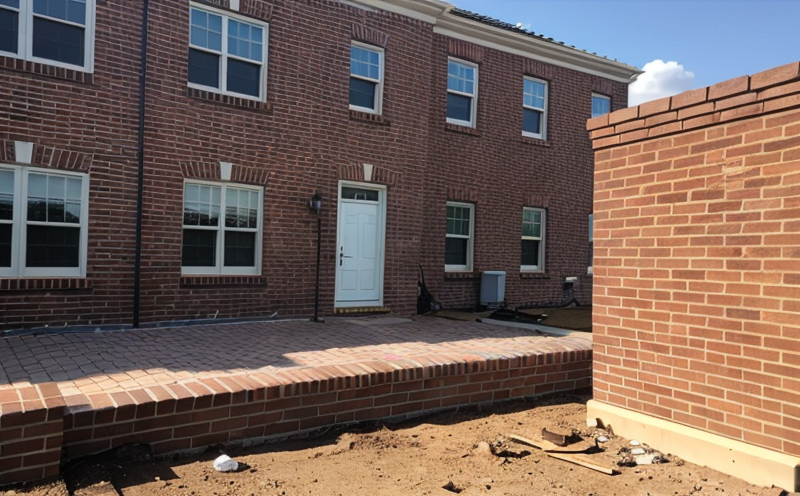ISO 10545 Porosity and Density Testing
The ISO 10545 standard is a comprehensive technical specification that provides methods for determining the porosity, density, and related properties of masonry units. This service is particularly important in the building and infrastructure sector where quality control and assurance are paramount to ensure structural integrity and durability.
Porosity and density testing plays a critical role in verifying the quality of materials used in construction projects. By assessing these properties, engineers and builders can make informed decisions about material suitability for specific applications. This service ensures that masonry units meet stringent international standards, which is essential for compliance with building codes and regulations.
The test procedures outlined in ISO 10545 are designed to be robust and reproducible, ensuring consistent results across different laboratories. The methodology involves the preparation of samples according to specified dimensions and conditions, followed by the application of various techniques to measure porosity and density accurately. These tests help identify any defects or inconsistencies that may affect the performance of masonry units in real-world applications.
Understanding the porosity and density characteristics of masonry units is crucial for predicting their behavior under different environmental and load conditions. This information is vital for optimizing material selection, enhancing structural design, and ensuring long-term durability. By leveraging ISO 10545 testing, stakeholders can achieve higher levels of confidence in the quality and performance of construction materials.
The service offered here focuses on providing accurate, reliable, and compliant test results that meet international standards. Our team of experts ensures that every step of the process adheres to best practices, from sample preparation to data interpretation. This dedication to precision and accuracy guarantees that clients receive trustworthy insights into the properties of their masonry units.
For those working in the building and infrastructure sector, ISO 10545 porosity and density testing is an indispensable tool for ensuring material quality. By adhering to this standard, professionals can ensure compliance with industry regulations while also enhancing project outcomes through better-informed decision-making.
Scope and Methodology
| Test Parameter | Description |
|---|---|
| Porosity | Determines the amount of void space within a masonry unit, which affects its performance in various applications. |
| Density | Metric that reflects the mass per unit volume of a material, providing insight into its compactness and quality. |
| Sample Preparation | Involves cutting samples according to ISO 10545 specifications to ensure uniformity for testing. |
| Test Procedures | Includes various techniques such as water displacement, helium pycnometry, and compression tests to measure porosity and density. |
The scope of ISO 10545 testing encompasses a wide range of masonry units, from bricks to blocks. The methodologies employed are designed to provide accurate and reliable results that meet international standards. This service ensures that every test adheres strictly to the guidelines set forth in ISO 10545, ensuring consistency and accuracy.
The process begins with careful sample preparation to ensure uniformity across all specimens. Once prepared, various testing techniques are applied depending on the specific properties being measured. For instance, water displacement is commonly used for porosity tests, while helium pycnometry can provide precise density measurements. Compression tests may also be conducted to assess mechanical strength.
The results of these tests are then analyzed and reported according to ISO 10545 specifications. This ensures that all findings are presented in a clear, standardized format, making them easily understandable for stakeholders involved in construction projects. By following this rigorous approach, we provide clients with comprehensive insights into the properties of their masonry units.
Benefits
- Promotes compliance with international standards and regulations.
- Ensures consistent quality across all samples tested.
- Facilitates informed decision-making regarding material selection and application.
- Enhances structural integrity by identifying potential defects early in the process.
- Reduces the risk of costly failures or discrepancies during construction projects.
- Aids in optimizing material performance through detailed property analysis.
The benefits of ISO 10545 porosity and density testing extend beyond mere compliance; they contribute significantly to the overall quality control efforts within any building and infrastructure project. By adhering to this standard, professionals can ensure that every aspect of masonry unit production meets stringent criteria, ultimately leading to more robust structures.
Customer Impact and Satisfaction
- Improved confidence in material quality through accurate testing.
- Enhanced compliance with international standards and regulations.
- Potential cost savings due to reduced rework or remediation efforts.
- Better project outcomes resulting from informed decision-making processes.
- Increased marketability of products meeting stringent industry benchmarks.
The impact on customer satisfaction is profound. By offering reliable and accurate ISO 10545 porosity and density testing services, we help our clients achieve higher levels of confidence in their masonry units' performance. This translates directly into greater trust among stakeholders, improved project outcomes, and ultimately increased market competitiveness.
Our commitment to providing top-tier service ensures that customers receive not just results but also valuable insights into the properties of their materials. This level of support fosters long-term partnerships based on mutual success and shared goals.





